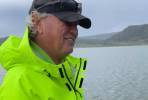After own health issues, Nordstrom volunteers for Cancer Action Network
On her first day at her job, then-36-year-old Jennifer Nordstrom had to take a little time off. It wasn’t for her youngest son’s birthday — it was his ninth — but for a regular medical appointment she’d booked months before landing her first job in the corporate world.
Less than three months later, she was in an operating room to remove the stage 3 breast cancer they found that day in December 2004. Doctors removed five tumors (two in her arm and three in her breast) and 26 of 52 lymph nodes.
“It didn’t run in my family and it was a very aggressive, fast-growing type of breast cancer,” Nordstrom said.
Eventually, she had a double mastectomy.
“No woman wants to lose her breasts. It really does mess with your self-esteem. Emotionally, it’s very traumatic,” she recalled. “You need to learn to fall in love with your body and accept the new you and what it looks like all over again.”
Twelve years later, she devotes her time to lobbying lawmakers for additional funding for cancer research. American Cancer Society’s Cancer Action Network is a grass-roots organization of volunteers who work to drive home the importance of cancer research, and funding for that research.
“We lose 40,000 women a year to breast cancer, and that’s just not OK,” Nordstrom said.
Through regular work with lawmakers, be it trips to Washington, local town halls, appointments with state lawmakers or just dropping in on influencers, Nordstrom and the army of Cancer Action Network volunteers work to improve funding for education, screening and research.
“Just putting a face with a story that expresses passion and desire for continued research funding and the expansion of education and screening speaks volumes,” she said.
The Cancer Action Network’s mission is to hold lawmakers — local, state and federal — accountable for their funding decisions, to demand they help the fight against cancer and be a part of decreasing the number of people who die from cancer. The nonprofit, nonpartisan organization aims to get everyday people involved with the politics of cancer.
The group funds lobbying and media campaigns, and emphasizes education within the community. Some of their funding is spent on training volunteers to be community advocates and teachers as well as hosting debates and educating the public about the politics of cancer funding — and where the candidates stand.
“We really need to make sure that the lawmakers put funding and money into screening and prevention and education,” Nordstrom said.
On Oct. 30, Making Strides Against Breast Cancer will walk at Red Rock Resort to raise money for the American Cancer Society. So far, 434 teams have raised $76,000.
The Cancer Action Network’s other major campaigns are One Degree, which pushes for cancer funding for the National Institutes of Health, National Cancer Institute and Centers for Disease Control and Prevention through the 21st Century Cures Act, and lobbying for the Palliative Care and Hospice Education and Training Act, which is currently before Congress to provide access to palliative care for cancer patients and their families.
According to the Cancer Action Network, federal programs have provided 8 million mammograms to women who otherwise could not afford them.
“We try to do as many face-to-face appointments and town hall meetings with these lawmakers so that when they’re making these big decisions in the Senate on these bills, hopefully, it will sway their opinion to continue funding, increase funding and not cut our budget for research, education and screening,” Nordstrom said.
On the day of her eighth, and final, chemotherapy treatment, Nordstrom’s doctor arrived with hope. Take a trial drug today and it could improve your chances. She said she didn’t hesitate. It was a trial that she had to take right away and there were no guarantees. But the chance of lowering her 85 percent risk of recurrence was worth the risk.
“A trial drug called Herceptin saved my life,” Nordstrom said. “Research and funding save lives.”





























